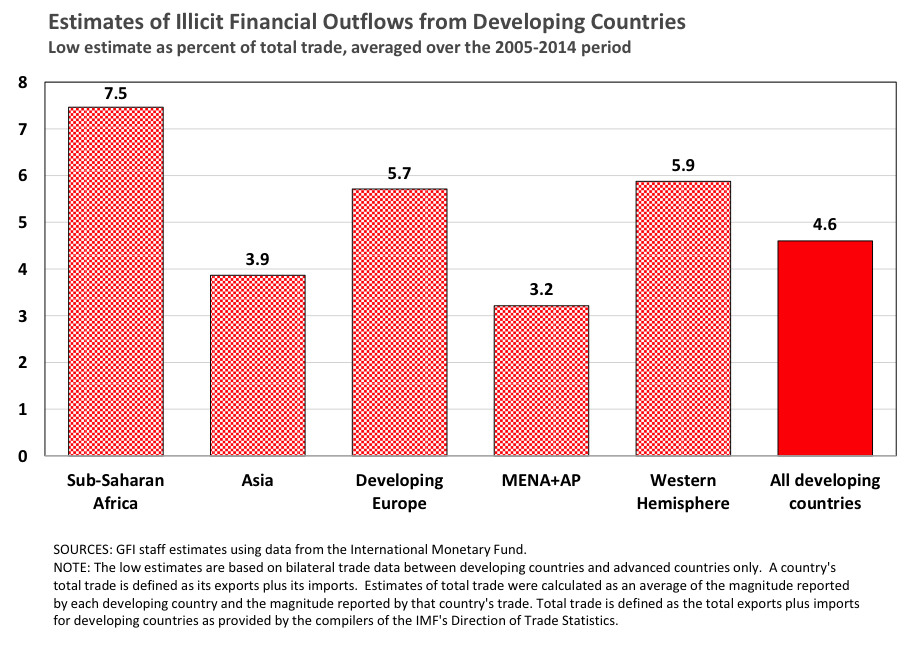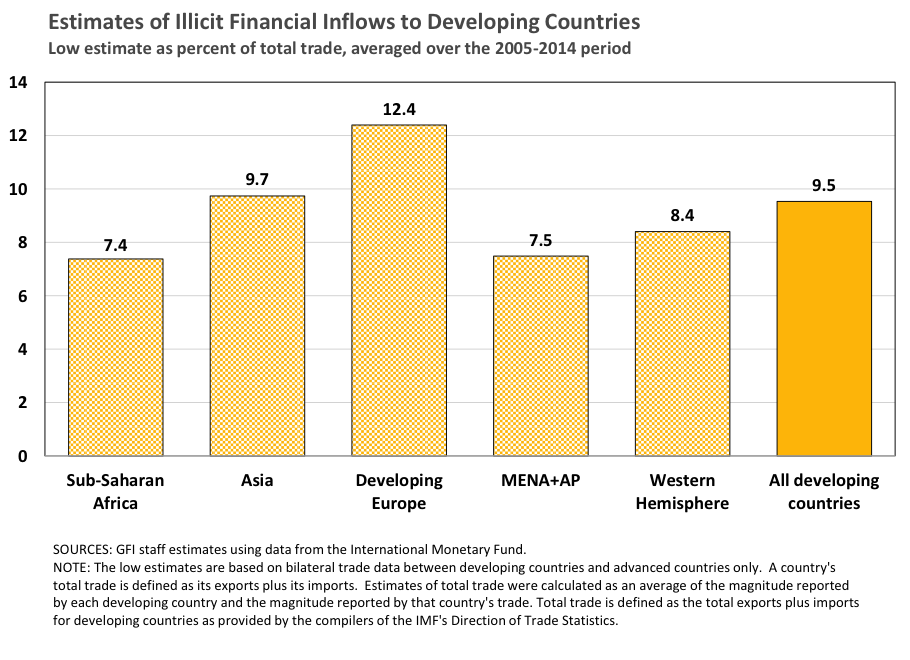Illicit financial flows (IFFs) from developing and emerging economies kept pace at nearly US$1 trillion in 2014, according to a study released today by Global Financial Integrity (GFI), a Washington, DC-based research and advisory organization. The report pegs illicit financial outflows at 4.2-6.6 percent of developing country total trade in 2014, the last year for which comprehensive data are available.
Titled “Illicit Financial Flows to and from Developing Countries: 2005-2014,” the report is the first global study at GFI to equally emphasize illicit outflows and inflows. Each is found to have remained persistently high over the period between 2005 and 2014. Combined, these outflows and inflows are estimated to account for between 14.1 and 24.0 percent of developing country trade, on average.
[wptab name=’Overview’]
Overview
Findings
- An average of 87 percent of illicit financial outflows over the 2005-2014 period were due to the fraudulent misinvoicing of trade.
- Illicit financial outflows from Sub-Saharan Africa ranged from 5.3 percent to 9.9 percent of total trade in 2014, a ratio higher than any other geographic region studied.
- Total illicit financial flows (outflows plus inflows) grew at an average rate of between 8.5 percent and 10.1 percent a year over the ten-year period.
- In 2014, outflows are estimated to have ranged between $620 billion and $970 billion, while inflows ranged between $1.4 trillion and $2.5 trillion.



[/wptab]
[wptab name=’Full Report Data’]
Full Report Data
A full listing of all the data from the report can be found below:
![]() Download all Data from Report (Including all Appendices)
Download all Data from Report (Including all Appendices)
[/wptab]
[wptab name=’Policy Recommendations’]
Policy Recommendations
Governments should establish public registries of verified beneficial ownership information on all legal entities, and all banks should know the true beneficial owner(s) of any account in their financial institution.
Government authorities should adopt and fully implement all of the Financial Action Task Force’s (FATF) anti-money laundering recommendations; laws already in place should be strongly enforced.
Policymakers should require multinational companies to publicly disclose their revenues, profits, losses, sales, taxes paid, subsidiaries, and staff levels on a country-by-country basis.
All countries should actively participate in the worldwide movement towards the automatic exchange of tax information as endorsed by the OECD and the G20.
To curtail trade misinvoicing:
- customs agencies should treat trade transactions involving a tax haven with the highest level of scrutiny;
- governments should significantly boost their customs enforcement by equipping and training officers to better detect intentional misinvoicing of trade transactions, particularly through access to real-time world market pricing information at a detailed commodity level; and,
- GFI has developed a product to assist governments in the detection of potential misinvoicing in real time—GFTrade™, a proprietary risk assessment application developed to enable customs officials to determine if goods are priced outside typical ranges for comparable products.
Governments should sign on to the Addis Tax Initiative to further support efforts to curb IFFs as a key component of the development agenda.
[/wptab]
[wptab name=’Read Report’]
Read the Report
![]() In addition to downloading the full PDF of the study, the full report can be read, shared, and embedded via the Scribd window below.
In addition to downloading the full PDF of the study, the full report can be read, shared, and embedded via the Scribd window below.
[/wptab]
[wptab name=’About’]
About
About Global Financial Integrity
Founded in 2006, Global Financial Integrity (GFI) is a non-profit, Washington, DC-based research and advisory organization, which produces high-caliber analyses of illicit financial flows, advises developing country governments on effective policy solutions, and promotes pragmatic transparency measures in the international financial system as a means to global development and security.
About the Authors
Matthew Salomon is Senior Economist at Global Financial Integrity. Prior to joining GFI in late 2015, Matthew served as Chief Economist with the U.S. Senate Budget Committee and the Joint Economic Committee of the U.S. Congress.
Joseph Spanjers is an Economist at Global Financial Integrity. Joseph received a BS in Economics and a BA in Global Studies from the University of Minnesota, and is currently an MA candidate at Johns Hopkins-SAIS.
Acknowledgements
The authors wish to thank and acknowledge Raymond Baker (President), Tom Cardamone (Managing Director), Christine Clough (Program Manager), Heather Lowe (Legal Counsel & Director of Government Affairs), Liz Confalone (Policy Counsel), and Samuel Romero Martinez (Economics Intern) for their contributions to the production of this report. The authors extend special gratitude to Dr. Dev Kar, now Chief Economist, Emeritus at GFI, for having pioneered GFI’s efforts in the estimation of illicit financial flows.
GFI and the authors would also like to acknowledge Gil and Lynne Leigh of Modern Media for their contributions to the layout and design of the publication.
[/wptab]
[end_wptabset skin=”gray” ]


